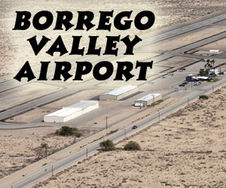Borrego Springs Radio Station? Why Not?
Last updated 5/11/2023 at 11:55am
Borrego Springs is a small desert town with a unique lifestyle. While it offers various resources and services for its residents, it lacks a local radio station. However, having a local radio station would bring many benefits to the community.
Let’s explore why a local radio station is important for Borrego Springs and how it can be used.
A Source of Community Information
A local radio station would provide an essential platform for community information. It could broadcast local news and events, keeping residents informed about what’s happening in town. This would also provide a forum for discussion on local issues and allow residents to voice their opinions on matters that affect their daily lives.
A Platform for Entertainment
It would be a great source of entertainment for the community. It could showcase local music, art, and literature, allowing residents to connect with the community and its culture.
Emergency Alerts and Updates
It would be valuable during emergencies or natural disasters. It could broadcast emergency alerts and updates to keep residents informed and safe during times of crisis.
Advertising Opportunities
As an excellent opportunity for local businesses to advertise their services, it could offer affordable advertising rates for businesses, helping to promote economic growth and development in the community.
Community Outreach
A local radio station could be used for community outreach programs, such as interviews with community leaders, charity events, and public service announcements. This would help to build stronger connections between residents and the community.
Podcasting
It could be used to record and distribute podcasts. Podcasts have become increasingly popular and offer a unique way of sharing information and ideas. Students and community members could use the radio station to record podcasts on various topics, including local news, history, and culture.
Educational Programming
A local radio station could offer educational programming for students of all ages. It could broadcast educational content, such as lectures, interviews, and panel discussions, providing students with valuable resources for learning.
Broadcasting Classes
Classes in broadcasting and media production could be offered. This would provide students with hands-on experience in the field and help prepare them for media production and journalism careers.
To conclude, having a local radio station in Borrego Springs holds significant importance as it could disseminate community news, entertainment, emergency notifications, advertising prospects, and community engagement. Though establishing a radio station might appear overwhelming, it is attainable with thorough research and planning.
I sincerely hope someone will step forward to take on this initiative and promote even greater community cohesiveness. It’s noteworthy that Mike Rue, based in our town, has already undertaken some crucial groundwork and would appreciate local support to get a local Borrego Springs radio station up and running. He can be contacted at FullSpectrumTechServices@gmail.com.
What Does It Take To Start a Local Radio Station?
Starting a local radio station from scratch can be exciting but requires careful planning and attention to detail. Here are some essential steps to consider when starting a local radio station:
Determine the type of radio station you want to start: Consider the type of music or programming you want to broadcast, the target audience, and the format (e.g., talk, music, news, sports, etc.).
Research the market: Conduct market research to identify the demand for your radio station in your local area. You can also assess the competition and determine what sets your radio station apart.
Secure funding: Starting a radio station can be expensive, and you’ll need to secure funding to cover the costs of equipment, licensing fees, and staffing. You may need to explore options like bank loans, private investors, or crowdfunding.
Obtain necessary licenses and permits: Before starting broadcasting, you must obtain licenses and permits from the Federal Communications Commission (FCC) and other relevant regulatory agencies.
Acquire equipment: You’ll need equipment such as a transmitter, antenna, mixing board, microphones, and studio equipment to get started. You can purchase or lease equipment, depending on your budget.
Build a studio: You’ll need a dedicated space to house your equipment and host live programming. You may need to lease a commercial space or build a studio from scratch.
Recruit staff: You’ll need a staff team to help run your radio station. Consider hiring a station manager, DJs, producers, and administrative staff.
Develop programming: Create a schedule that aligns with your station’s format and target audience. You may need to hire programming consultants to help with this.
Promote your station: Develop a marketing strategy to promote and attract listeners. This may include advertising, social media, and community outreach.
Starting a local radio station can be complex, but as a community, we can create a successful and rewarding venture with careful planning and attention to detail.



